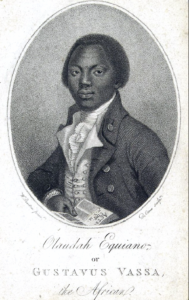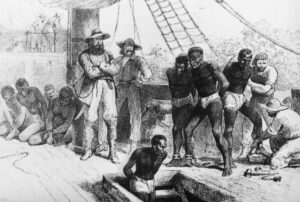Equiano’s Tales of African and European Slavery

Portrait of Olaudah Equiano (Wikipedia)
In the second chapter of Olaudah Equiano’s memoir, Interesting Narrative (1789), Equiano immersed his readers in his experience as a victim of slavery and the international slave trade. The narrative began with his time as a child in the southern region of what today is Nigeria. Equiano then detailed his experiences being kidnapped and traded as a slave in western Africa, before concluding the chapter with a description of his arrival to Barbados after a treacherous journey on a slave trading ship. His description of his time as a slave in Africa did not include violence or harsh labor, but rather emphasized the toll that the forced separation from his family had taken on him. He explained how his sister was “torn” from him and as a result, they were “deprived of even the small comfort of weeping together.” Equiano started to experience European culture after he was sold multiple times and moved closer to the coast. The most memorable introduction occurred on the slave ship en route to the Americas where he not only saw things that were vastly different from his African culture, but observed behaviors that were callous and inhumane. He provided graphic descriptions of European cruelty on the ship, like the flogging, killing, and starving of the passengers. When the slaves on board were being examined by potential buyers before the ship continued onward, Equiano assumed that “those white men with horrible looks, red faces, and loose hair” were eventually going to eat him. He stated “I even wished for my former slavery in preference to my present situation, which was filled with horrors of every kind,” further demonstrating the Europeans’ questionable behavior.
As a slave in Africa, Equiano suffered from an emotional sadness due to his enslavement, but he encountered much worse upon meeting Europeans. Equiano was enslaved by both white people and people of his own race, but he explained how those of his same race who enslaved him treated him objectively better than the Europeans did. This demonstrates that slavery was not necessarily race-based in all places, which may have been similar to the kind of slavery Aristotle was referring to. It also raises the question of who is really a “savage?” Europeans thought Africans were because they were different, and Africans thought Europeans were because they were inhumane. Cultural difference is not universal, but cruelty is.
Excerpt from Olaudah Equiano’s Interesting Narrative, read by Charlotte Goodman with music by Nick Rickert:
By: Charlotte Goodman, June 2021
